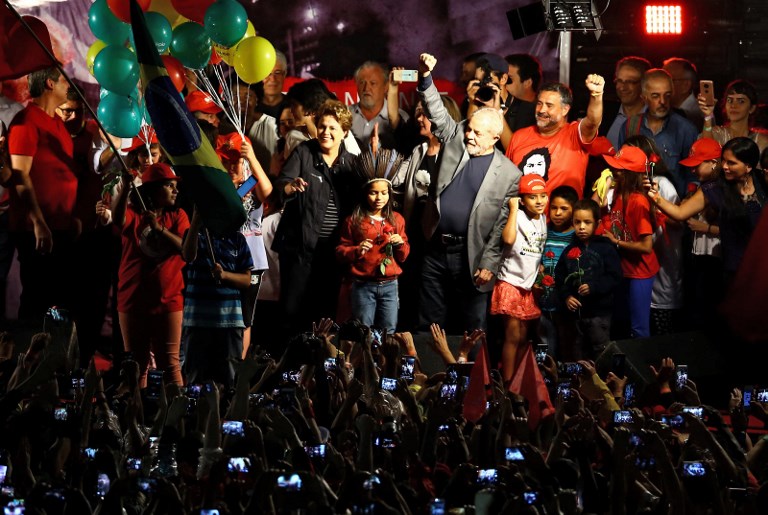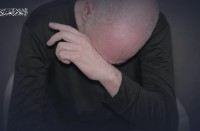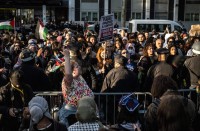
by Damian Wroclavsky with Sebastian Smith in Rio de Janeiro
© Agence France-Presse
BRASILIA, Brazil (AFP) — Tensions ran high Tuesday in Brazil ahead of a Supreme Court ruling on whether former president Luiz Inacio Lula da Silva should start a 12-year prison sentence for corruption, potentially upending this year’s presidential election.
The court showdown scheduled for Wednesday has become a focal point for Brazil’s deeply divided electorate ahead of the October polls, in which Lula is currently the heavy favorite.
Protesters both for and against Lula planned rallies across Brazil, with demonstrators in Brasilia to be separated by a metal barrier and heavy police presence.
Brazil’s most famous anti-corruption prosecutor, Deltan Dallaganol, tweeted that he was fasting and praying for Lula to be jailed. Lula supporters, meanwhile, went on social media to compare the leftist former president to Nelson Mandela and his critics to fascists.
Lula, 72, was sentenced to 12 years and one month in prison after being convicted last year of accepting a seaside apartment as a bribe from a huge construction company seeking government contracts. He appealed in a lower court but lost.
Under current law, that means he should go immediately to prison, while conducting further appeals. However, Lula has asked the Supreme Court to grant him habeas corpus recourse, allowing him to remain free while pursuing those appeals.
The court is believed to be evenly split on the issue, with one judge changing position enough to secure Lula’s freedom — and boost his uphill bid for a third term in office.
If the court turns him down, he could face jail this week.
Coup threat
Those on the left who remember Lula for lifting tens of millions of people out of poverty during his two terms in 2003-2010 consider the threat of prison as an attack on democracy.
Lula told a large crowd in Rio de Janeiro late Monday that he saw his legal problems as continuation of the fight against a two-decade dictatorship that ended in 1985.
“I did not accept the military dictatorship and I will not accept this dictatorship of the prosecutors,” he said.
But an army reservist general joined in the heated rhetoric by warning in Estadao newspaper that the Supreme Court would “induce” violence and “fratricidal conflict” if it allows Lula to walk free.
General Luiz Gonzaga Schroeder Lessa, who has a history of making provocative remarks, even said an eventual Lula election victory would “leave no recourse but an armed reaction. The armed forces would have to restore order.”
The case has also put the top court under huge pressure from prosecutors like Deltan Dallagnol, who are spearheading Brazil’s mammoth “Car Wash” anti-graft probe, which has netted scores of high-ranking politicians beyond Lula.
On Monday, more than 5,000 judges and prosecutors signed a petition against granting Lula his habeas corpus request.
On Wednesday, Prosecutor General Raquel Dodge said that allowing convicted criminals to stay free pending several appeals would “annihilate” the justice system.
However, one of the 11 Supreme Court justices, Gilmar Mendes, tried to reassure the nation, saying the court’s ruling — whichever way it went — would lead to “a calming down, not an increase in conflict.”
Lula is not the only big Brazilian politician in trouble this week.
Current center-right President Michel Temer, who already faces two corruption charges, is embroiled in new controversy following the arrests of several close associates on graft charges.
They were charged last Thursday in connection with the “Car Wash” probe into whether port logistics company Rodrimar was given contracts at Sao Paulo’s huge Santos port after bribing Temer.
A third charge against Temer could be announced, although as long as he is in office he faces little risk of prosecution.
© Agence France-Presse







